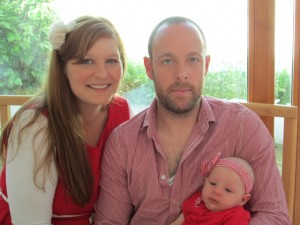
For most women hospital is an integral part of pregnancy but not for Katie Ingle the former Sandymount resident. When Katie first became pregnant she knew straight away that a hospital birth was not for her. She spoke to her GP about the possibilities of a home birth. Katie knew that there is a shortage of midwives for home births so she put her name down in the first month of her pregnancy.
A ‘Self Employed Community Midwife’ (SECM) who is paid by the HSE purely for home deliveries was allocated to Katie. There are 20 in total in Ireland. Check-ups were had with her GP, scans and tests at the hospital and meetings and tests with her SECM, so Katie felt triply protected. The Rotunda and Holles Street were close enough in case of complications but by her own admission she was healthy and remained so throughout her pregnancy. Home births need to be in the range of 37 to 42 weeks. Anything outside these parameters requires hospitalisation.
On the night before the birth she had been out for dinner and thought she had eaten something that didn’t agree with her but later on that evening she had a ‘show’. At 6am she rang the midwife who arrived within a few minutes and got the birthing pool set-up while Katie used a TENS machine for pain relief. A TENS machine passes mild electrical impulses under the skin which helps your body to produce its own pain killing substances called endorphins. At 7am her waters broke and a few minutes later she noticed a trace of meconium in the waters. Meconium is a dark green substance, normally stored in the infants bowel until after the birth. If it is spotted in the waters during labour it can indicate fetal distress. This can be very serious, but the midwife examined her and said it was in such a small quantity that they could continue at home. At 8.15am her gorgeous daughter Siofra was born in the birthing pool in the kitchen in the family home.
Throughout the short labour she had used a technique called ‘hypno-birth’ which is a self-hypnosis technique which significantly reduces stress in labour. Katie had been practising these techniques for months and had downloaded the MP3’s from www.gentlebirth.ie which gives a real insight into how relaxation techniques in labour can have a huge positive effect.
A few short minutes after Siofra was born she was in the centre of the family bed with her proud parents on either side glowing from the emotion of the event. Katie feels so passionately about the whole experience and encourages others to consider home birth. She is acutely aware that she had no medical complications and lives on the doorstep of two maternity hospitals. She believes women should make careful individual decisions.
There were only 200 home births in Ireland last year, yet Katie’s grandmother had 15 children, all born at home in Sandymount. There are huge benefits to home births; being in familiar, comfortable and private surroundings, under no time pressure to get to hospital, you have one-to-one care, your family and friends are with you the whole time, and you have increased bonding with them. Katie knows first-hand that home births are an amazing experience and an option that any expectant mother should give huge consideration to.
www.homebirth.ie
By Joan Mitchell

